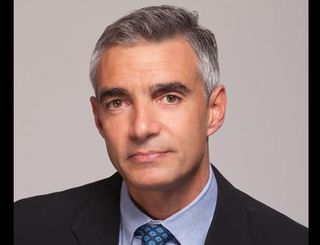Peter Liguori

For the Bronx-born, Yale-educated Peter Liguori, success in the television business has been tied directly to the First Amendment. “I would give my life for the First Amendment,” the Tribune Media CEO says.
At Tribune, such loyalty to the Constitution means, for one thing, supporting day-to-day digging by an industrious army of local broadcasters, whose stations comprise one of the company’s cornerstone assets. “As someone who studied history in college, I have always been fascinated by and curious about the truth,” Liguori says. But as he zooms out and reflects more broadly on a career that has also seen him build brands at FX Networks and Fox Broadcasting, Liguori says valuing freedom also means supporting writers, directors and show creators as they work toward their own truth. “I try to get out of their way as much as possible,” he says of news teams and programming creatives, “and allow them the space to do what they do best.”
One prime example came in the early 2000s, when Liguori was running FX and Ryan Murphy came in to pitch a sharp-edged drama revolving around plastic surgery. Nip/Tuck would go on to run 100 episodes, from 2003 to 2010. It expanded the prestige brand FX had started with The Shield a few years earlier and forged a relationship with Murphy that would enrich Fox when he created Glee (during Liguori’s run at the network) and FX again with this year’s The People v. O.J. Simpson: American Crime Story. From the moment he began describing Nip/ Tuck to Liguori, Murphy said he “oddly, instantly felt at home, even though I am nothing like him at all.
“Before I left the room, Peter said, ‘I’m in. I want to do it. I love it,’” Murphy says. “‘I don’t know why I want to do it. But I love it.’”
Known for his rare combination of intellect and the ability to rein judgment in completely and just listen, Liguori gets high marks from colleagues and collaborators for promoting ingenuity in those around him—and for recognizing it in the first place. Two decades into a career in TV’s upper executive echelon, Liguori remains unassuming, crediting predecessors and partners for any good results. The father of two and a former Big Brother volunteer is known as the first person people would call in both good times and bad.
“I have just enormous trust in Peter,” says FX Networks president and CEO John Landgraf, who succeeded Liguori in the job. “I would take his word to the bank, and it would mean as much to me as anybody I’ve ever met.”
During his three-plus years at Tribune, Liguori has played a key role in transforming a business once known for its namesake newspapers into a 21st century media company that has put a trying bankruptcy process in the rear-view mirror.
Broadcasting & Cable Newsletter
The smarter way to stay on top of broadcasting and cable industry. Sign up below
On Liguori’s watch, Tribune’s broadcast group nearly doubled its local station footprint with the acquisition of 19 stations from Local TV in 2013. The following year, the company refined its focus on broadcasting, rebranding itself as Tribune Media after spinning off its publishing unit, which is now known as tronc.
Also under Liguori, Tribune expanded into music technology and the metadata business with the purchase of Gracenote. WGN America, Tribune’s longtime superstation, is becoming a player in cable after swapping Chicago sports including Cubs baseball for original series, such as the acclaimed Underground.
Asked about the recent series of moves, Liguori doesn’t tell war stories or evince too much emotion at all. He simply says it comes with the territory, that “as CEO of a publicly traded company, my No. 1 priority is shareholder value.” Similarly, when asked to cast his mind back to his origins in entertainment, he describes his main motivation, succinctly, as “paying my bills.”
Landgraf saw that Liguori managed one crucial feat that went over well with talent. “He pushes the credit for creativity downward,” the exec says. “Peter is an extremely empowering leader.”
Creating that kind of supportive culture at Tribune, given that its roots run a lot deeper than any Hollywood operation’s, has been a top priority. “Creating content that has purpose and truth and integrity is a cornerstone that I have inherited here at a company with a 175-year-old tradition in doing that,” he says. “And it’s a great honor to continue doing that.”
“To serve, inform and advocate” is the mission of local stations, Liguori says. “We are always making sure that we are relevant, that we innovate and we are doing so with purpose and integrity.”
In order to instill that sense of service, “I try to give them the ability to expand what they have dedicated their lives to doing by giving them digital platforms, and giving them the space and advocacy work and resources to dig down deep for a bigger, more complex story,” he says. “Then they take it from there.”
Liguori says local TV has proven its value in “answering the call to the greatest moments of need,” evident in stations’ response to crises such as tornados in Oklahoma or Hurricane Sandy along the East Coast.
“This all speaks to people who dare to criticize the value of local news,” he says. “When you see our reporters visit their own high schools, visit the apartment buildings in which they grew up—and you see the heartfelt response to that and the commitment to rebuild, you have no choice but to be proud.”
